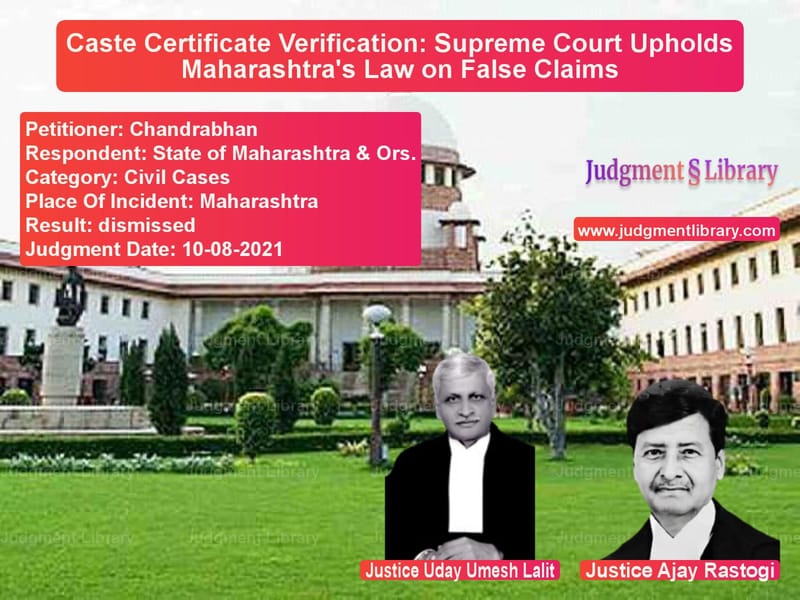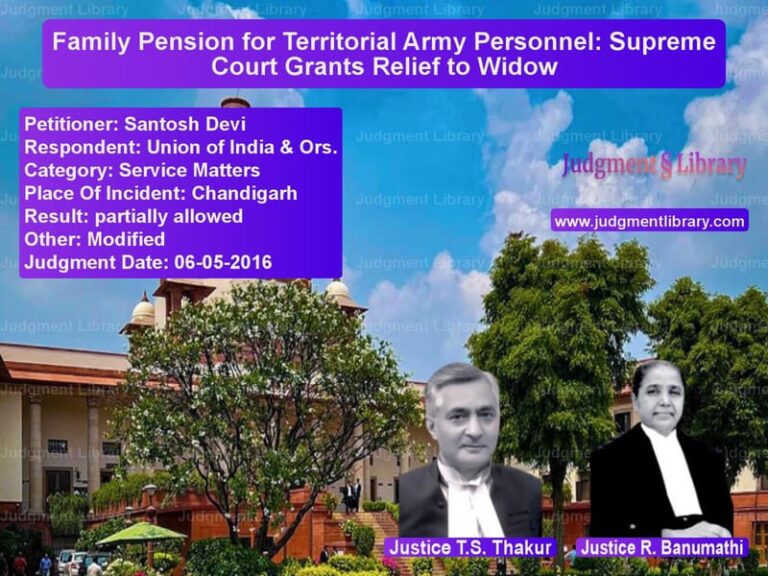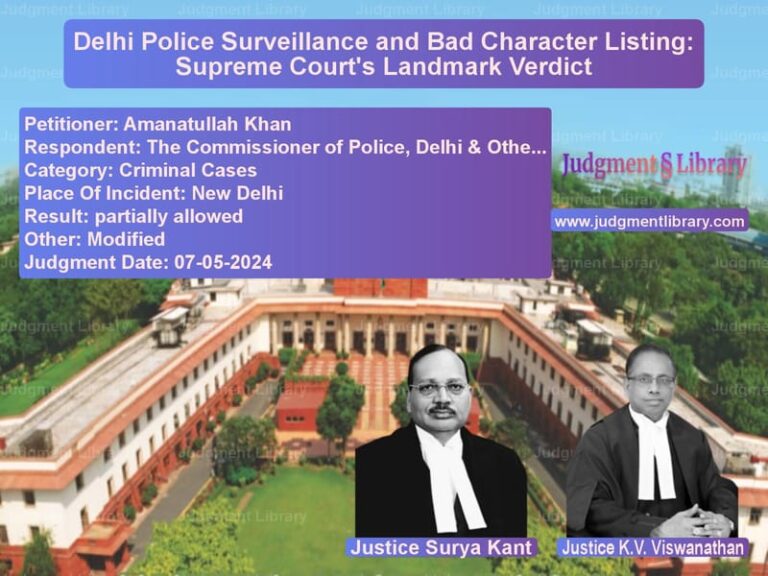Caste Certificate Verification: Supreme Court Upholds Maharashtra’s Law on False Claims
The case of Chandrabhan v. State of Maharashtra & Ors. is a landmark ruling by the Supreme Court of India on the verification of caste certificates and the consequences of false claims to Scheduled Tribe (ST) status. The Court upheld the findings of the Maharashtra Caste Scrutiny Committee and reinforced that individuals falsely claiming Scheduled Tribe benefits cannot continue to enjoy the advantages granted under the reservation system.
Background of the Case
The appellant, Chandrabhan, challenged a judgment from the Bombay High Court, which upheld the Caste Scrutiny Committee’s decision rejecting his claim that he belonged to the Scheduled Tribe ‘Halba.’
The Constitution (Scheduled Tribes) Order, 1950, provides a specific list of recognized Scheduled Tribes in each state. The appellant contended that he belonged to the ‘Halba’ Scheduled Tribe, which is entitled to reservations in education, employment, and other benefits in Maharashtra.
However, the Constitution Bench of the Supreme Court in State of Maharashtra v. Milind & Others (2001) had earlier ruled that ‘Halba-Koshtis’ from Maharashtra could not be considered as belonging to the ‘Halba’ Scheduled Tribe. The Court held that Scheduled Tribes must be identified strictly as per the Constitution (Scheduled Tribes) Order, 1950, and no evidence beyond this could be considered.
Petitioner’s Arguments
The appellant raised several arguments to support his claim:
- His caste certificate was genuine and should be recognized.
- The Caste Scrutiny Committee wrongly interpreted his caste status.
- Past judgments allowed individuals who had completed education under a false caste claim to retain their degrees.
- His family members had been recognized as belonging to the Scheduled Tribe in the past.
- Any revocation of his caste certificate would unfairly penalize him after he had relied on it for years.
Respondent’s Defense
The State of Maharashtra countered the claims with the following arguments:
- The Constitution (Scheduled Tribes) Order, 1950, clearly specifies which groups qualify as Scheduled Tribes.
- The Caste Scrutiny Committee’s findings were based on well-established legal principles.
- False claims deprive rightful candidates of their reserved benefits and must be dealt with strictly.
- Allowing people to continue enjoying reservation benefits based on false claims would be unfair to genuine Scheduled Tribe members.
Supreme Court’s Analysis and Ruling
The Supreme Court carefully examined the legal framework governing caste verification and false claims. It reaffirmed its ruling in Milind & Others that:
“The Scheduled Tribes Order must be read as it is. It is not even permissible to say that a tribe, sub-tribe, part of or group of any tribe or tribal community is synonymous to the one mentioned in the Scheduled Tribes Order if they are not so specifically mentioned in it.”
The Court also cited its earlier ruling in Jagdish Balaram Bahra & Others (2017), stating:
“Where a benefit is secured by an individual—such as an appointment to a post or admission to an educational institution—on the basis that the candidate belongs to a reserved category for which the benefit is reserved, the invalidation of the caste or tribe claim upon verification would result in the appointment or, as the case may be, the admission being rendered void or non est.”
The Supreme Court held that:
- The appellant’s claim was unsustainable, as ‘Halba-Koshti’ is not synonymous with ‘Halba’ under the Constitution (Scheduled Tribes) Order, 1950.
- Under Maharashtra’s 2001 Act, any benefits obtained through false caste claims must be revoked.
- The law applies even if an individual has completed education or obtained employment based on a false claim.
Key Legal Provisions Cited
The Maharashtra Scheduled Castes, Scheduled Tribes, De-Notified Tribes, Nomadic Tribes, Other Backward Classes, and Special Backward Category (Regulation of Issuance and Verification of) Caste Certificate Act, 2000, was crucial in the Court’s ruling. Section 10 of this Act states:
“Whoever, not being a person belonging to any of the Scheduled Castes, Scheduled Tribes, De-notified Tribes, Nomadic Tribes, Other Backward Classes or Special Backward Category, secures admission in any educational institution against a seat reserved for such categories, or secures any appointment in the Government or local authority, shall be debarred from the institution or discharged from employment forthwith upon cancellation of the caste certificate by the Scrutiny Committee.”
Consequences of the Ruling
The Supreme Court’s ruling had the following implications:
- The appellant could not claim Scheduled Tribe benefits in education, employment, or any other constitutional provisions.
- All reservations and advantages enjoyed under a false caste certificate must be revoked.
- The Maharashtra law on caste certificate verification is valid and must be strictly enforced.
- Future applicants must ensure that their caste claims align strictly with the Constitution (Scheduled Tribes) Order, 1950.
Impact on Reservation Policies
This ruling reinforces the importance of genuine caste verification and prevents misuse of reservations meant for disadvantaged groups. It upholds the legislative framework ensuring only rightful candidates benefit from affirmative action policies.
The Supreme Court concluded:
“The credibility not merely of the legal system but also of the judicial process will be eroded if such claims are protected in exercise of the constitutional power conferred by Article 142 despite the State law.”
Final Judgment
The Supreme Court dismissed the appeal, ruling that:
- The appellant’s caste certificate was invalid.
- The benefits obtained through the false claim must be withdrawn.
- The appellant cannot claim Scheduled Tribe status for any further legal or constitutional purposes.
Conclusion
The ruling in Chandrabhan v. State of Maharashtra is a critical judgment in ensuring the integrity of India’s reservation system. It prevents wrongful claims from depriving genuinely disadvantaged groups of their rightful opportunities. The decision underscores that caste verification laws must be enforced strictly to maintain fairness in educational and employment reservations.
Petitioner Name: Chandrabhan.Respondent Name: State of Maharashtra & Ors..Judgment By: Justice Uday Umesh Lalit, Justice Ajay Rastogi.Place Of Incident: Maharashtra.Judgment Date: 10-08-2021.
Don’t miss out on the full details! Download the complete judgment in PDF format below and gain valuable insights instantly!
Download Judgment: chandrabhan-vs-state-of-maharashtra-supreme-court-of-india-judgment-dated-10-08-2021.pdf
Directly Download Judgment: Directly download this Judgment
See all petitions in Education Related Cases
See all petitions in Public Interest Litigation
See all petitions in Judgment by Uday Umesh Lalit
See all petitions in Judgment by Ajay Rastogi
See all petitions in dismissed
See all petitions in supreme court of India judgments August 2021
See all petitions in 2021 judgments
See all posts in Civil Cases Category
See all allowed petitions in Civil Cases Category
See all Dismissed petitions in Civil Cases Category
See all partially allowed petitions in Civil Cases Category







